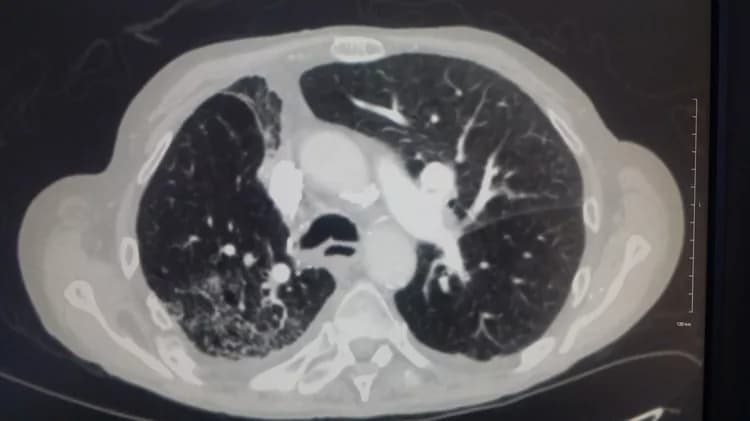
New Antibody Drug Conjugate Shows Early Promise in Small Cell Lung Cancer
CHICAGO – Early findings from a first-in-human clinical trial showed that antibody drug conjugate (ADC) rovalpituzumab tesirine (Rova-T) shows promising efficacy against recurrent small cell lung cancer (SCLC). The treatment, which combines a novel anti-DLL3 antibody with a powerful anticancer agent, halted tumor growth in 89% of patients with high levels of DLL3 in the tumor and shrank tumors in 39%.
The study will be featured in a press briefing today and presented at the 2016 American Society of Clinical Oncology (ASCO) Annual Meeting.
“We’ve seen too few successes in recent years for small cell lung cancer, which makes these early signs of efficacy all the more encouraging,” said lead study author Charles M. Rudin, MD, PhD, a medical oncologist and chief of Thoracic Oncology Service at Memorial Sloan Kettering Cancer Center in New York. “Although these results are preliminary, rovalpituzumab tesirine seems to be the first targeted therapy to show efficacy in small cell lung cancer, and we may have identified DLL3 as the first predictive biomarker in this disease.”
About the Study
The ADC rovalpituzumab tesirine comprises an anti-DLL3 antibody and a cancer-killing agent, pyrrolobenzodiazepine dimer, which damages DNA. The antibody component of the ADC serves to deliver the anticancer agent to the tumor and into cancer cells.
Approximately two thirds of patients with SCLC have high level DLL3 on the surface of cancer cells, and the protein is essentially absent from heathy adult tissues. DLL3 is known to regulate cancer stem cell biology in SCLC. Rovalpituzumab tesirine is the first agent to target DLL3.
The Phase I study enrolled 74 patients with SCLC that worsened despite at least one prior systemic therapy. About two-thirds of patients had extensive-stage disease at diagnosis, and the other third had limited-stage disease. When tissue samples were available, the researchers assessed levels of DLL3 protein in the tumor tissue.
Key Findings
Eleven out of 60 (18%) evaluable patients experienced tumor shrinkage, and 41 (68%) achieved clinical benefit (having at least stable disease). Nearly all the patients who responded to the treatment had elevated levels of DLL3 in their tumor.
Among the 26 patients with the highest levels of DLL3 in the tumor, 10 (39%) responded to the ADC, and had a median overall survival of 5.8 months and a 1-year survival of 32%. Within this group of patients, the 12 patients who were receiving the ADC as third-line therapy responded particularly well, with 50% having tumor shrinkage (confirmed objective response).
The most common severe treatment-related toxicities included serosal effusion (fluid build-up around the heart or lungs), low platelet counts, and skin reactions. These adverse effects appeared generally to be manageable with medications, or resolved without specific interventions.
Next Steps
The findings of this early-stage trial will need to be confirmed in larger clinical trials. A single-arm phase II pivotal trial in patients with DLL3-positive SCLC that has worsened despite at least two prior therapies was launched earlier this year. Other upcoming trials will evaluate rovalpituzumab tesirine in first line SCLC and other DLL3-expressing neuroendocrine cancers.
About Antibody-Drug Conjugates
Antibody-drug conjugates (ADCs) are large molecules in which anticancer drugs are attached to an antibody. The antibody targets a protein that is abundant on the surface of cancer cells, but is preferably rarely found on healthy cells.
When the antibody attaches to the target protein on a cancer cell, the cancer cell internalizes the ADC. Inside the cancer cell, the cancer drug is released from the antibody where it exerts its cancer-killing effect. Through such targeted delivery of cancer drugs to cancer cells, collateral damage to healthy tissues is minimized. In fact, the cancer drug in the rovalpituzumab tesirine ADC is so potent that it cannot be given by itself, but it is safe when given in the context of an ADC.
There are only two ADCs currently approved in the United States for the treatment of patients with cancer. However, dozens of different ADCs are being tested in clinical trials.
About Small Cell Lung Cancer
An estimated 225,000 Americans will be diagnosed with lung cancer this year.1 SCLC accounts for 10% to 15% of lung cancers. This type of lung cancer is very difficult to treat and most patients survive only a year or less after diagnosis.2 The standard initial therapy for SCLC is chemotherapy with etoposide and platinum-drug. The only FDA-approved therapy for recurrent SCLC is topotecan.
This study received funding from Stemcentrx, Inc.
View the full abstract.
The above post is reprinted from materials provided by American Society of Clinical Oncology (ASCO). Note: Materials may be edited for content and length.
Disclaimer: DoveMed is not responsible for the adapted accuracy of news releases posted to DoveMed by contributing universities and institutions.
Related Articles
Test Your Knowledge
Asked by users
Related Centers
Related Specialties
Related Physicians
Related Procedures
Related Resources
Join DoveHubs
and connect with fellow professionals

0 Comments
Please log in to post a comment.